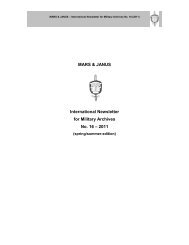National Experiences - British Commission for Military History
National Experiences - British Commission for Military History
National Experiences - British Commission for Military History
You also want an ePaper? Increase the reach of your titles
YUMPU automatically turns print PDFs into web optimized ePapers that Google loves.
70 ai r p o w e r in 20 t H Ce n t u ry do C t r i n e s a n d em p l o y m e n t - nat i o n a l ex p e r i e n C e s<br />
The new concept was met with mixed feelings and it divided the opinion of<br />
planners at all levels. The criticism, which continued until the execution of the<br />
operations centred on three factors:<br />
1. How to reliably predict the collapse of the Egyptian will and moral? Would<br />
the Egyptian people rise against Nasser?<br />
2. How long should the Allies continue the bombing offensive to achieve the<br />
breaking point?<br />
3.<br />
Would the <strong>British</strong> and French governments withstand international pressure to<br />
cease hostilities during a prolonged air offensive?<br />
In spite of the criticism, the concept was accepted and finally developed into a<br />
plan. It was supported at least by the Chairman of the COS-committee, Chief Air<br />
Marshall William Dickson; the Chief of Air Staff, Air Marshall Dermont Boyle and<br />
by the Minister of Defence, Walter Monckton, who had a sceptical view on the use of<br />
<strong>for</strong>ce throughout the autumn. 50 According to Rhodes James, the change of plan was<br />
an unpleasant surprise <strong>for</strong> Prime Minister Anthony Eden. 51 He was not convinced<br />
of the new concept even after a private conference with General Keightley. Yet, he<br />
chose not to oppose his senior military advisers and the new concept was accepted<br />
by the Egypt Committee on 10 September. 52<br />
The air offensive was based on an assumption that the Egyptian will would to<br />
collapse. But how to produce a reliable assessment of their morale? The <strong>British</strong><br />
– nor the French – did not have an adequate answer to this fundamental question.<br />
The views of the service intelligence agencies were not unanimous, though the<br />
Egyptians were in general thought to be lower category opponents in the face of<br />
the modern war machine. 53 The Joint Intelligence Committee54 , responsible <strong>for</strong> the<br />
co-ordination of the <strong>British</strong> intelligence community, produced a surprisingly spare<br />
amount of documents during the crisis and it is not known whether the reports of the<br />
<strong>British</strong> ambassador suggesting heavy resistance were delivered to the Task Force<br />
Commanders. 55<br />
The overall intelligence arrangements were subjected to criticism after the<br />
crisis was over. The Task Force Commanders were unsatisfied with the flow of<br />
50<br />
On Monckton’s views on the use of <strong>for</strong>ce, see, e.g., Selwyn Lloyd, Suez 1956, A Personal Account<br />
(London: Book Club Associates, 1978) p. 133 and Anthony Nutting, No End of A Lesson, (London:<br />
Constable & Company Ltd., 1967), pp. 106-107.<br />
51<br />
James Rhodes, Anthony Eden (London: Weidenweld and Nicholson, 1986), pp. 508-509.<br />
52<br />
Jonathan Pearson, Sir Anthony Eden and the Suez Crisis. Reluctant Gamble (Basingstoke: Palgrave,<br />
2003), pp. 68-69.<br />
53<br />
NA ADM 116/6137, The Director of Naval Intelligence to the First Sea Lord, 25 September 1956<br />
and WO 288/98, G(Int) HQ 2 Corps, 19 August 1956, “An Estimation of Probable Egyptian Reactions<br />
to Present Threat”.<br />
54<br />
For the composition and tasks of the committee, see NA CAB 158/39, JIC (57) 123, 29 November<br />
1957.<br />
55<br />
NA AIR 20/9229, JIC (ME) “Bi-Weekly Intelligence Review No 10”, 27 September 1956.



